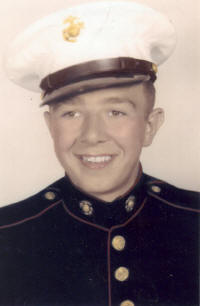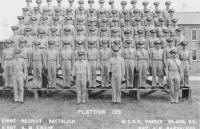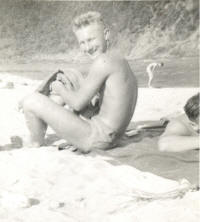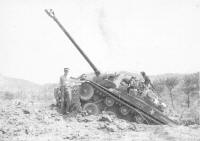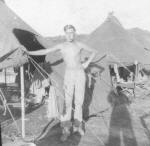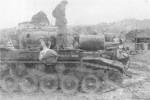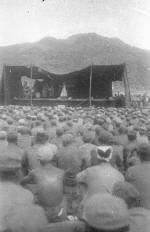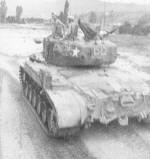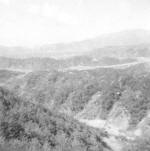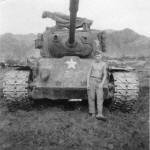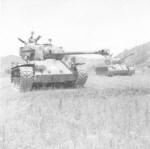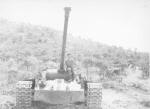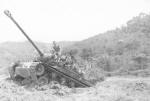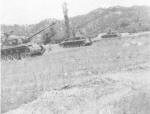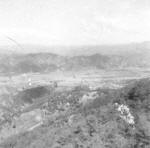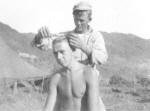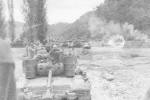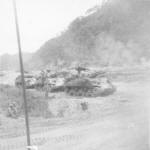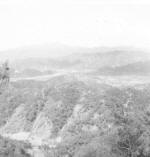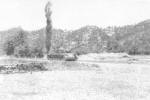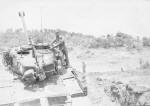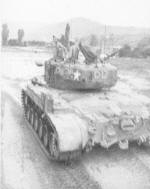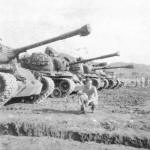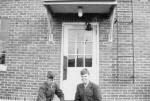|
We need your help to keep the KWE online. Jim Doppelhammer, our longtime webhost, has passed away and his webserver will go offline
in 2025. The entire KWE website must be migrated to a modern server platform
before then. If you value this resource and want to honor our veterans by keeping their stories online
after 2024, please donate now.
For more information, click here.
|
|||||||||||||||
 |
|||||||||||||||
| Back to "Memoirs" Index page | |||||||||||||||
Dean F. ServaisLeesburg, FL "The tragedy of the Chosin Reservoir campaign was the dead. The wounded. The weather. And the poor Army troops in combat without the proper training that cost so many of their lives. How did I survive the Chosin? Why me? I still think about that. I give most of the credit to good training, officers who knew what was going on, our equipment, Marine and Navy air power, and prayer." - Dean Francis Charles Servais
|
|||||||||||||||
Memoir Contents:
Pre-MilitaryI am Dean Francis Servais, born July 12, 1931, in Kenosha, Wisconsin. My father was Anton Servais and my mother was Edith Thome Servais. Father was the chief engineer and maintenance man in an eight-story office building in Kenosha. The engineer was responsible for the heating and cooling of the building. All remodeling in the building was done by him and an assistant. My mother worked as a replacement cleaning woman. If one was sick, she took her place. My siblings and I helped her many times. I had an older sister, Natalie, who was killed in an auto crash in 1935. Additionally, I have a brother Donald, now age 80, who is a retired mechanical engineer in Wisconsin, and a sister Joyce, 78, who lives in Northern Georgia. I attended all eight grades of grade school at Saint James Catholic School, then attended high school through the 11th grade at Kenosha high school. While I was in high school, I had a job in a book and office supply store and warehouse in downtown Kenosha. I was a stock boy for Brosk Office Supply. My brother and I were both Boy Scouts and liked it a lot. We went to summer camp two times, and many campouts at different times of the year at the local scout cabin in the county park seven miles from town. I earned a star rate. Most of my best friends were in scouting. I was age ten in 1941 and remember World War II, although I can't think of much I did. I remember saving tin cans, papers, tin foil from cigarette packs, and the bacon grease. Every Sunday we said some prayers for the service men at Sunday Mass. In school we had paper drives. We were urged to cut out articles from the local paper and send them to the servicemen. My brother served four years in the Navy air wing and was a rear gunner on a dive bomber. He was on the carrier USS Lexington. Joining Up
I enlisted in the Marine Corps to get out of finishing high school. I was bored stupid and too young to realize what I was doing, so I quit in 1948 to join the United States Marine Corps. I have a GED diploma acquired while in the Corps. I never regretting joining. A good friend Don Lodginski and I decided to join together. I had read lots of stories about Pacific battles and the courage of the Marines, and I had a cousin who was a horse Marine in the 1920s and 30s. He was a great guy. I thought that the Marines had a mystique about them, and I liked the way they stuck together and never left their buddies behind in battle. It all turned out to be true. Don made a career of the Marine Corps and became a "lifer." After serving in the Corps for over twenty years, he retired and lives in Southern California. My mother did not like the idea that I had joined. She suffered a lot of agony during World War II. When my older brother was in the Navy in the Pacific Theater, there were long months when she never heard from him. My Dad thought it was great and that it might make a man out of me. Besides, it was peace time, and he never thought that anything like another war was coming up. I joined on July 18, 1948. I took a train to Chicago, then transferred to a train going to Beaufort, South Carolina. No one I knew traveled with me. There were other recruits on their way to Parris Island, but they were all strangers to me. The first thing that happened when we arrived at the train station was some Marine Corps officers got on the train and started yelling at us. "Get off the train. Line up. Stand up straight. Shut up." They told us that none of us were fit to be a Marine. They told us that at roll call we must answer with "Sir" at all times. And then we got on busses that took us over to Parris Island. There, the same routine went on. We moved into a large building like a gym, and lined up. We all had to strip naked and fold our clothes at our feet and stand at attention for what seemed hours. They shaved our heads and we were now called "Skinheads." Next we had a physical, were issued our uniforms and equipment, and were turned over to our drill instructors, who marched us to our barracks with us carrying all of our stuff. They let us know what dumb asses we were all the way there. Those of us in Platoon 135 were assigned our bunks and told how to square our things away. We were read the riot act and told all the rules. We were marched to chow and back and then put to sleep. The end of a perfect day! Our senior DI was S/Sgt G.M. Lillie and the assistant DI was J.H. Barsaleau. These D.Is were well-trained to make us Marines. Some of the things they did during boot camp made no sense at all until months and years later. The only reason I am here today after Korea and the Chosin Reservoir is because they cared and taught us how to survive and be Marines. During the twelve weeks of boot camp, they taught us discipline and respect, as well as cleanliness and hygiene. Over the weeks of training we marched and drilled endlessly. We also spent classroom time on first aid, military code of justice, how to dress and act like a Marine, weapons used, and history of the Corps. The only films seen in boot camp were on the weapons and, of course, "venereal disease." I remember them well! We also spent two weeks on the rifle range learning about our rifles and firing them. We learned and fired machineguns, flame throwers, rocket launchers, and hand grenades, and we learned to keep them clean and oiled at all times. Our days were very regimented. Reveille was at 5:30 a.m. with a bugle call, and we tended to personal hygiene, which was an important lesson learned in boot camp. Our barracks had to be spotless or we did not go to bed until they were. Free time usually was after evening chow. Chow was not a good memory for me. There was always plenty, but it was not very tasty. Taps came at 9 p.m. We were awakened in the night at least once a week to clean the barracks, undergo rifle inspection, answer roll call, and many other reasons. Our DIs were very strict. They allowed no small chit chat and we always addressed them as SIR. They did not seem to pick on any special person. If one screwed up, the whole platoon was punished. This way we all watched over each other and learned about brotherhood. Our DIs were very fair—just strict by the book. I don’t remember a DI ever hitting a man. Instead, they ordered extra exercise, marching, or cleaning as our usual punishment. The only time I received extra detail was for not knowing a subject I should have known. As punishment for such an infraction, we usually had to clean the latrine or have extra guard duty on weekends. One time they hoisted the red flag on the parade ground, which meant it was "Too hot for drilling." The DI heard a Marine say something like, "Thank you, Lord" and he took us behind the barracks in the sand and drilled us there, where we could not be seen. Another day it was raining and someone said, "No drilling today. Hurray!" The DI heard him and we drilled all day in the rain. One time a Marine peed his pants and had to do laundry by hand all weekend. Most discipline was for the whole platoon. We had squad leaders, platoon leaders, and these men watched all of us and let us know when we screwed up and how to fix it before the DIs saw it. Everyone helped each other out if possible. We learned to work as a team and had no bad troublemakers in our platoon. I believe we had three who did not make it out of boot camp. One was for medical reasons and the other two were homesick. Parris Island, South Carolina, is located on the South Atlantic coast amidst a vast swamp and many lakes and backwaters. It was very hot in the summer, had lots of sand, and very few trees for shade. What little breeze there was, was hot! As always around swamps, there were snakes, flies, mosquitoes, gnats, and lizards. We were given repellants, but as we sweated, we lost it. A few times we ran problems in the swamps. We got bitten a lot, but no one was injured seriously. As an individual, the only thing I was graded on that I can remember was on weapons. We had to qualify with the M-1 rifle and we could rate from marksman to expert. We were all shown how to wear a gas mask, herded into a tin building, and there they sent in tear gas. After a while, they made us take off our mask, stay in there another minute, and then come out. Our eyes were burning and we were all crying like babies. We didn’t have a lot of "fun" in boot camp, although we played some volleyball and went swimming. After about ten weeks we were allowed to go to the PX once. I was NEVER sorry I joined the Marine Corps. I was proud to be a Marine from the moment I was sworn in at Chicago and will be until the day I die. It was a tough way to live, but what the Marines did for me and what they taught me can never be duplicated. If not for the Marines, I would not have seen the world, including Europe and Asia. I would not be the man I am today – and proud of it. The hardest thing in boot camp was keeping up with the rest. I was a 17-year old, 120-pound skinny runt. It was my first time away from home and sleeping in a large room with a hundred other guys I did not know. I came out twelve weeks later, still 17 but now weighing 135 pounds with a hundred new friends, and as a MAN! We had a graduation parade on the parade grounds. About five platoons graduated at the time. A Marine band played all the military tunes and we marched in review for the General. I felt we were trained very well and outside of not having our uniforms tailored, I felt very good about myself. I felt ready to move on and was anxious about my new base and job. When I left boot camp, I was starting a new era in my life. I was looking forward to traveling and meeting new friends. I was anxious to learn my new job. A whole new world awaited me. When I first came to boot camp, I had no idea what was in store for me, and I was scared. But not any more. Boot camp training was very rugged. There, we were taught to obey orders without questioning them and to stay in the best of physical shape at all times. This training served me well in Korea. Next AssignmentWhile in boot camp, we took an aptitude test, and the results of it determined our next assignment. I was overjoyed at being assigned to tanks. Being mechanically-inclined helped a lot. Also, knowing that I would ride instead of marching was nice. (I didn't count on losing my tank at the Chosin!) I knew that there were many different weapons on a tank and that I would have the opportunity to know them all inside and out. Knowing that I would learn about engine care and repair was a plus also. I was given a ten-day leave before I was to report to my tank assignment, so I went home by bus. I was very happy to see my family, especially my Mom. She was a special mom as I was to learn in the next four years. I wore my uniform now and then. I took my girl to a dance in my dress blues. Wow! All my friends were glad to see me, and some were jealous and kidded me. I had a great time. After my leave, I went by bus to duty at Camp Lejeune, North Carolina, arriving about October of 1948. There I was sent directly to the 2nd Tank Battalion. After arriving at the tank battalion, I was assigned to a company and to a barracks wing. We had two-story, H-shaped brick barracks. Each wing held about 100 men per floor, in open wing. Each had a separate metal bed. Only senior NCO's had a separate room, and these were for two. Our platoon officers and NCOs were our instructors. Many were World War II veterans, and were very knowledgeable. One thing stands out in my mind. All non-NCOs were required to serve a month of duty in the mess hall, serving, preparing, cleaning, and washing dishes. It was a ritual that all men who get married would receive an eight-piece setting of silverware with USMC inscribed on them from the men on duty at the mess hall at the time. I was assigned to Company "A", then my platoon, then my tank. All of my tank training at Lejeune came as hands on experience as a member of an individual tank crew. Tank school was constant. Almost every day we marched out to the tank park (around a mile), checked out and maintained our tanks, and then went through different weapons training, vehicle service procedure, or driving a different course. We learned how to drive and shoot under all conditions, terrain (in woods, on a beach, in a town, on hills, and in the desert), weather, and battle conditions. We learned how to fuel, load ammo, work in formation, and (what turned out to be most important), live in one for long periods of time. We had maneuvers in the Virgin Islands and in the Caribbean Sea. We learned all aspects of a tank—how to drive one, maintain one, the job of assistant driver, as well as that of gunner and loader. Our five man crew had a tank commander, gunner, loader, driver, and assistant driver. At one time or another we held each job and learned all aspects of that job. We had field trips all the time and had small problems concerning tanks in battle. We also had some (but not as much) classroom training on gunnery and engine maintenance, radio handling, and message problems. Every so often we had a day of school on "Military Justice," Marine Corps history, First Aid, and battle line health items. At all times we were assigned to a certain tank and were under our tank commander. During my time at Camp Lejeune, we were allowed out on liberty evenings and weekends as long as we were not on guard duty or fire watch and mess duty. When I first arrived at Camp Lejeune, all the tanks were Sherman-type tanks. Later we began to receive some M-26 rebuilt tanks. In my three and a half years in tanks, I never remembered getting any new factory tanks. All were rebuilt. We went to Korea in M-26s and received M-46s after we returned from the Chosin. The 46 was larger and had more armor plate. It was faster, different and easier to drive, and had more horsepower. The guns were updated and newer, and it was easier to operate. All around it was a new model of the M-26. I was assigned to the 2nd Tanks for two years and went to the Caribbean Sea for three months of maneuvers and cruising. We had liberty in many exotic ports. Next our Company was assigned to a Mediterranean cruise. To explain, one company of tanks and one battalion of infantry, plus supporting units, were always on standby aboard Navy ships in Europe. I believe that this was to be prepared for any attacks on U.S. embassies in that part of the globe--a quick response team close by. The units were replaced every six months. While over there we visited many ports in many nations in Europe, Asia, and Africa. We held maneuvers on the island of Malta and Sicily, where we learned how to land on a beach off landing craft. It was quite an experience for an 18-year old boy from the Midwest. War Breaks OutThe above took place the first two years and a half of my tour. Then while home on leave in 1950, the Korean War broke out. I had never heard of Korea--knew nothing at all about it. The first I heard of the war was in the headlines of our local newspaper, the Kenosha Evening News. I figured we would be in it since it was in the Pacific and that's Marine territory. I was well-trained and anxious to go. All of our training was about fighting and winning. The history of the Corps was part of our lives, and we wanted to make more history. A telegram a few days later told me to return to my base as quickly as possible. I became very excited and left the day after. You must remember that I had just turned 18. World War II was just over and stories of those battles were still fresh. I was excited and ready to go to war. Danger never entered my mind. For me, going to war in Korea was a lifetime high. I could not believe that I was going into combat and would be able to fight for my country. For two years I had been taught to fight and kill the enemy, and now it was going to happen. Believe me, I had no idea what was going to happen, but I couldn’t wait to go. It was a great and proud feeling. My father gave me lots of advice, but my mother was clearly scared. She hugged and kissed me a lot, and spent a lot of time in church. My older brother had spent two years fighting the Japs in the Pacific as a dive bomber, and now she had to worry about me. My parents were very religious, and they prayed for me every day. Big brother wished me luck. I was ready to go, but knowing that Mother would cry a lot bothered me. She cried when I left. I went back to base in North Carolina. Our outfit was already getting ready when I returned to Camp Lejeune. Reserves were being called up and outfitted. Some of us were picked to stay behind to train new arrivals. I personally was told on arriving back to the base that I would be part of a group staying behind to train new personnel. I requested to be able to join my company and ship out with them, but was refused. I was told that new personnel were arriving and also many reservists had to be trained. During this time I never had much time to communicate with friends. What letters I received from friends wished me good luck and a quick, safe return. I was too busy to worry about myself and what could happen, but I took the time to call and talk to my parents a lot before I left. Each week I was away my mother kept a steady stream of letters, with always some four leaf clovers included. My mom had an eye for four leaf clovers. Every time she walked in our large yard, she was always bending over and getting a few. She had a bowl in the broom closet on the shelf, and it was always at least half full. I still have a letter from her that I received in Korea with a few four leaf clovers in the folds. She was a wonderful lady and mother. All this time we were building up our Company strength in equipment and manpower. We received our rebuilt Army (as always) tanks, cleaned them up and supplied them, and then in a very short time tied them to the railroad flat cars to ship them to California. As soon as we were up to strength and the stateside training ended, we shipped out also. This was a few weeks after our main group had left for the west coast. We boarded trains for California in early August of 1950, and off we went. I had no wife, no steady girlfriend, no car. No one was allowed to take leave, but I personally did not know one Marine who was not ready and willing to go to war. The mood among our group and all groups that I came in contact with was very good and all "Gung Ho" ready and anxious to go. Our leadership was the best and we were well-trained and ready. We did wish for newer equipment, as most of ours was rebuilt tanks, but other than that, everyone was ready to go. At this time of my life, I was very proud to be a Marine and was ready for action. Everyone thought it would be over in a few months. We were wrong! On to KoreaWe arrived at Camp Pendleton, California, after almost a week on a train. After joining the 1st Marine Division, we only spent about six days loading our tanks and equipment aboard ship. Then the troops boarded ship and sailed for Japan. I would say that we sailed from the USA in late August 1950. Our ship to Korea was a Landing Ship dock (LSD). I can't remember the name of it. It was a large, flat-bottom ship. The rear of the ship could lower the stern like the tailgate of a pickup truck, and then flood the inside to allow landing craft to float into it. Our tanks were each on a separate landing craft. After loading the landing craft or unloading them, it closed the stern and pumped out the seawater. The ship had a crew of about a hundred men. Also there were landing craft crews of about 75 men, and, of course, all the crews of the tank company--another 150 Marines--with about 25 tanks on landing craft. I had traveled to the Caribbean Sea for maneuvers on an LSD in early 1949 and again in late 1949 to the Mediterranean Sea in Europe for a six month cruise, so I did pretty good at getting my sea legs, and only got sick once in a storm. I remember lots of storms on the open sea, and not many were real bad. Believe it or not, our company trained our new men about tanks aboard ship going to Japan and then Korea. We actually trained men to drive a tank and shoot cannon while in the hold. Many of them had never fired a round in their lives until they reached Korea. During the training, there were no mishaps outside of scrapes and bruises. We trained the new men with what we call a "dry run". We taught them all the things like driving, going through all the problems and trials without starting the engine, shifting gears, steering by example. A tank at that time was steered with two brake levers--right brake, turn right, left brake, turn left, slow down or stop, pull both levers together. Gunnery was also by dry run, setting up firing missions, elevating and lowering the gun barrel, rotating the turret, and loading and unloading training rounds that had no powder or explosive heads. We taught them how to clean the 90mm howitzer and break it down many times. We also had maintenance problems that we worked on such as changing oil, fixing and replacing fan belts, and changing and setting spark plugs. We worked on track problems, too, explaining what to do if we threw a track or broke a sprocket. All of this was done in the hold of a large freighter at sea. It was interesting. Everyone was all hyper and raring to go. Besides the daily training (except on Sunday), all personnel on a ship had to do some duty for the Navy. It could be mess duty, laundry, or chipping and painting. On our off time we had some movies and cards. I did not personally know any of the ship's crew. Most of the Marines we knew since we had been together for about a month. Some of us had been together before Korea starting in North Carolina. We were among the first Korean veterans, but on the trip we discussed about what can happen in war with the vets of World War II. I would say that one quarter of our people were World War II veterans. Most talk was on tank problems and maintenance, and what was the tank's place in an offense and defense. Also, we learned what to look for in supplies, and what we would need the most. Supplies for the tanks were important. Fuel and ammo were Number One, then came food. And one of the most important things for tanks was the Tank Retriever--a tracked tank with no gun. It had a hoist and mechanics to fix and tow tanks that had problems. Very important! Those who operated them were great guys. After our ship left San Diego, we sailed to Kobe, Japan. We spent three days there loading ammo and fuel, leaving all of our personal gear in our sea bags in a large warehouse, where it stayed for 14 months. All we took with us to Korea was a knapsack with a few changes of clothes and a shaving kit. Liberty was short so we didn't get far from the ship--a few bars and a brothel, I think. We sailed for Korea and the Inchon Landing on September 15, 1950. We would soon find out how good our training was. The "old salts" and the new men did great once on land and in combat. Most of the new men went into battle for the first time as we rolled off our landing craft at Inchon, Korea. For those of us who had been in the tank company much longer (I had arrived in tanks about October 1948), this was also our first time in action, but at least we knew our tanks. I feel that my training after boot camp was excellent, and my being here today is proof of that. The Marine Corps prepared us all as to what to expect, how to react, and what was expected of us. We trained as a unit and every man knew all the jobs and could fill in any place. My only regret is that we had no cold weather training. In the first months of winter in Korea we also did not have the proper equipment for that kind of weather and fighting. Going into war, no one even thought about "cold weather", but we should have. Inchon LandingWe arrived at Inchon during the night of September 14 and stayed offshore while the Navy battle group pounded the shoreline. We rechecked our equipment, but not much else was happening onboard ship as we waited. We knew that sleep would be scarce for awhile, but we could not sleep much with the naval battle group shelling the shore. We were behind them, but the noise was deafening. That evening, our company CO gave us a rough idea of what was coming the next day with regards to the tides and sea walls, what kind of weapons the North Koreans were using, what our air power was doing to help, which outfit we were supporting, times, etc. Very early on the morning of the invasion, we were briefed on where we were to land, who we were supporting, and how far we were expected to proceed the first night. We were also told how to I.D. our forces and radio call signals for each unit. For the crews, the information they gave us was pretty basic. The tank commanders had a more thorough explanation. We did not leave the ship until the afternoon of the 15th. The last hour on the landing ship dock (LSD) was something else. We were all excited, but I don't remember anyone that was scared, or if they were, they did not show it. Our ship was hollow and opened from the rear to one third from the front. Inside were Landing Ship Mechanized (LSM) craft which held one tank each. The rear of the ship was like a pick-up truck with a tailgate. They flooded the interior of the hull till the landing craft floated and then lowered the tailgate. The Navy men started up the engines and we sailed out of the LSD. They then pumped the water out until it was dry. It was real neat. After we sailed out of the ship, the landing craft formed up in a circle formation, away from the LSD, to await our turn to land. Unlucky for us, our formation was just off the USS Wisconsin. The battleship was shelling the enemy inland and every time a salvo went off, it seemed like our landing craft jumped clear out of the water. We had a long wait before we headed for the beach--four hours, more or less. From what I remember, I was in the third wave on Blue Beach with the 7th Marine Regiment. Our orders were to hook up with the 7th Marines and support their drive inland. It was darn near dark by the time we landed. We had left the ship in the early afternoon and circled for hours waiting for the tide and the bombardment to lift off the beach. There were ships of every kind involved in the Inchon Invasion. You name it. If the Navy had one, it was there. We could see ships from horizon to horizon. For the landing troops there were APA’s, AKA’s, LST’s, and LSD’s. There were fighting ships of all kinds—battleships, the Wisconsin, cruisers, destroyers, destroyer escorts, etc. There were perhaps 120 ships all together, but that is only my guess. I really don't know how many there were, but there were a lot! All of the sounds of ships, a steady explosion of ships' guns, many aircraft bombing the beach and shoreline, and our own landing craft’s engines were very loud. As we neared the beach, all the tank engines came on. Plus there was a steady stream of radio communications going on all the time. All of our air support was Navy dive bombers and Marine Corsairs. The night before, the Air Force had bombed also, and as we were going on the beach, the Air Force was bombing Seoul that day. It was quite a sight. I did not know of any other country’s troops that were in on the invasion. The 7th Army Division also was in on the invasion, but I don’t know where they were or what they did. The tide was all important. The beach had a high sea wall, and if the tide was not "in", then we had to beach our landing craft farther out from shore and climb the high wall. This left the troops out in the open and at the mercy of the enemy firing. With the tide in, we could motor right up to the sea wall and use it as a shield. As for the tanks, we could not climb the wall, so where we landed the wall had to be blown away by the engineers. In some places it had been blown up by the naval guns. Where and when my unit landed, enemy fire was light, although we had sniper fire and some mortar fire. The weather was cloudy and warm. As we landed on the beach, there were men all over the place—mostly infantry, as well as some engineers and artillery. We actually landed on Inchon Beach before some of the men who left North Carolina a month before us. Hard to believe, but it is true. There was no confusion. Everything worked like a well-oiled machine. We knew what we were dong and how to do it. Everyone was orderly and seemed to know what was going on and where they were going. Our CO took command and assigned platoons of tanks to assist units in the push forward. We took no prisoners. In combat, tankers are locked in a steel hull shooting up a storm, and in a tank we barely had room for ourselves. The first night was a breeze and we felt comfortable. Scared, but comfortable. We believe the naval gunfire caught the enemy off guard and sent them running. That first day was a dream. I was an 18-year old driving a tank in combat. There was no time to think. When I try to look back and remember, the first thing I think of is that I was lucky to have such great training. I have few memories of the port of Inchon itself. All I remember were shells of buildings, mostly burning. Not much else happened that first day. Our action didn't start until the next day when we moved forward to support the infantry. The first time I stepped out on the soil of Korea was that first night. My first impression of Korea was that it was backwards and dirty. There were people living in shacks and no sanitary facilities. It was 30 years behind the times. There were fires all over, gunfire in the distance, and lines of prisoners being led to a camp. We were all very tired, but who could sleep? After a time, I dosed off until they woke me to stand guard. Pushing AheadIn the morning, 1st Marine Division, 1st Tank Battalion, Dog Company, pushed ahead at dawn and met mild resistance. I was in the first platoon, driving D-12 tank. Fighting was sporadic, but not heavy. I remember a few roadblocks, and in the towns and villages we got sniper fire, but never did have to see any guerilla activity. The enemy was withdrawing at a fast pace. At this time in the "Police Action", most of the fighting was in the daytime, but nothing held us up. Being a tank company, we advanced in our M-26 tanks supporting the 7th Marines infantry companies as we moved forward. Our company commander sent us from one area to another as firefights erupted. When the infantry ran into a bunker with a machinegun, we were called in and we blew them away with our 90mm cannon. This was all new and very exciting for us. Every time we fired on the enemy that first few days, it was exhilarating. We could see roadblocks and pill boxes, shots coming out of windows, but not many enemy. We also was lots of Russian tanks, all smashed and burning--all hit by air strikes. It would be a week before we saw one moving and firing. Outside of mines, they had nothing that would hurt us. We felt fairly safe until the first tank hit a mine. Then it got scary. It was the only one of our tanks that hit an anti-tank mine and was disabled. The mine blew up and forced in the escape hatch, crushing the driver’s legs. Frank Villardi was evacuated to Japan and then flown back to the states where they were able to save his legs after many operations, although he still has problems with them. He now lives in Central Florida. He received a Purple Heart and was given a medical discharge. The mine had disabled not only Frank, but also his tank. After this accident happened, we began welding burned out machinegun barrels across the escape hatch to strengthen them. You see, the hatch, when released from the inside of the driver’s seat, fell down and away from the tank and the crew could crawl down and out under the tank between the tracks. By welding the gun barrels to the hatch on the outside, it strengthened the hatch and made it harder to blow up and in like it did on Frank, yet they still could be released and fall down. Most people know what the outside of a tank looks like, but the inside is something else. In the front of the tank, next to the ground, sit the driver and assistant driver, both with the ability to drive the tank. We each had a periscope about two inches by six inches in our entrance hatch. The driver had most of the controls and instrument panel, and the assistant had a .30 caliber machine gun that only moved 30 degrees up, down, and sideways. Each had the drop away escape hatch under our legs. The gunner, loader, and tank commander were behind us in the turret. The gunner sat next to the breech of the 90mm cannon. He could raise and lower the 90mm and traverse the turret. Above him sat the tank commander with his legs on each side of the gunner. He could see outside in a larger periscope, operate the radio, and talk to us all in our earphones. At times he could open his large hatch and had a .50 caliber machine gun at his service. Also in the turret was stored machine gun ammo, 90mm shells of different types, and a generator. Most of our personal gear and water was strapped on the outside of the turret or in hollow fenders. Our loader was across from the gunner. He could move around easier than any of us and he was our all-around man. We worked as a team. The terrain in Korea was lousy for tanks. There were narrow roads and many rice paddies that were muddy for us. And then the mountains were terrible with narrow roads and sharp curves, and many blind spots. I don’t remember if it took us two or three days to reach Kimpo airfield. You have to remember I was a tank driver and all mode of transportation for me was by tank (until the Chosin). Once we got to Kimpo, I don’t remember seeing any buildings other than just some smoldering ruins. I can’t even remember an airstrip. We arrived at night and I was put on perimeter watch until dawn. Fighting at Kimpo was light. There was not much enemy resistance. Being a tank driver and not knowing the positions and the overall amount of enemy troops, I can’t tell you the amounts of troops or what did happen at other points other than right where I was. The North Korean troops we engaged were hard fighters and fought darn hard against us. At Kimpo they were fighting a delaying action, trying to hold us up so reinforcements could be brought up. We hardly stopped at Kimpo before moving out again. Our tanks did not stick around to see any Allied airplanes come in. We moved on to take Seoul. Although we were new to the country, we weren’t there to sightsee. When we were not fighting or sitting watch on line, we were doing maintenance on our tanks like refueling, adjusting tracks and fan belts, lubricating grease fittings, replenishing our ammunition, and cleaning the machineguns and our 90mm. We were really busy all the time. After Kimpo we went on to the liberation of Seoul. The time frame after Inchon is not much to talk about. As we moved up, it was routine as far as we were concerned. We seemed to get adjusted to being dirty, tired, and doing our job as we were trained. Engaging the enemy was a job and we did it. Dead people were part of it. If it went well, we were happy. If it went bad, we were sad. Killing was our job, and we did it. I didn’t like it personally, but I did what I had to do. We never had a chance to get with the refugees or see many on the lines. The Marines had a policy of not fraternizing with the civilians. Below is my best way to describe what happened at this point in time:
Not too many prisoners were taken at this point, and what few we did take were dazed and out of it mentally. Up to this time most of the fighting took place in the daylight. Now they were coming out at night and that made us more nervous. If it was light action at the point we were at and another unit could use help, away we went. Especially at night we moved all over the place. Our tank commander guided us, usually with the turret hatch open. He could see more and farther than I could. I can't remember any of my platoon's tanks getting disabled, but our platoon leader's tank took a direct hit on the top of the turret by a North Korean mortar. It blew off his .50 caliber machine gun. No trace of it was ever found. All of our tanks took machine gun bullets all over. We had some equipment tied on the rear of the turret and it got shot up some. Machine guns could not hurt our tanks, but the bullets sure chipped up the paint! By now we had been ashore for about two weeks and had seen lots of fighting. We had not had much sleep. Seeing dead bodies did not phase us anymore, and the wounded were everywhere. We had lost some of our own men, and new men were coming in to replace them. It seemed like we always were doing something—traveling from one point to another, reloading, and maintenance. It would have been nice to keep a journal, but who had the time! Our main role in the advance was to support the infantry, knock out roadblocks, get the snipers who harassed them, as well as destroy the machineguns that held them up. And we were used as transports for them, too. We could load up ten or fifteen Marines and take them to where they were needed. Like air support, when they could not do the job, they called for us. At times we ran into heavy enemy resistance, and no matter how hard we tried to blow them out, they hung in there. That’s when we called in the beautiful Corsairs. There was an airplane way past its time, and yet still going strong. Our Marine and Navy pilots could fly those gull wing angels in on a target, almost stop above it and release their bombs or napalm right on top of a point we asked them to. They were our angels of the sky. They were beautiful and one cannot say enough about those pilots. Other times, when we attacked a position and poured heavy fire onto the enemy, the North Koreans realized that it was hopeless to fight on and they came out with hands in the sky and no weapons. As we always worked with the ground troops, they took them in tow and turned them over to the nearest Korean troops to take care of them. Only once did we support the Korean Marines, and that was only for a short period of time. The one thing we heard about them was that they took no prisoners. I could not say if they were an effective fighting force. Our tank battalion consisted of five companies--A, B, C, D, and Headquarters Company. A through D were equipped with M-26 Pershing tanks. Each company had four platoons of five tanks, twenty tanks per company. HQ Company had three M-26 Pershings and five Sherman M-4 flame tanks. These were the flame thrower tanks. Each platoon had a Lieutenant in charge, and each Company had a Captain in charge. The battalion was headed by a Major or Lieutenant Major. The battalion Executive Officer was a Captain. For my fourteen months duty in Korea, I spent 12 months as a tank driver and two months as a tank commander. My tank was D-12, called Dog 12. Our platoon of five tanks supported all different units of the division. There were five tanks to a platoon and three platoons and a company commander’s tank to a tank company, as I recall. First platoon's tanks all were numbered 11 through 15; second platoon’s was numbered 21 through 25, and third platoon’s was numbered 31 through 35. A tank's role in combat can be offensive or defensive. In Korea, tanks were used in offense mainly to destroy machinegun nests, break up roadblocks, and advance quickly to the rear of an enemy to destroy them. They were also used as moving artillery and harassment firing at night to the enemy's rear. In defense, they were used to protect roads, as a roadblock, and lots of times were used as moving reinforcements to block holes in our defenses. Many nights we traveled up and down our lines to whoever needed us. While on the defense, sometimes a company of tanks loaded up some infantry, charged ten or fifteen miles behind enemy lines destroying all we could, then fired our 90mm guns in salvos as far into enemy country as possible. When troops were advancing on the enemy, sometimes across open ground, we drove ahead and they walked alongside or behind us. The enemy set up roadblocks made of burned out vehicles, carts, and boulders, and covered them with machineguns. We went on ahead and engaged the guns and pushed the obstacles off the road. Sometimes they built bunkers of logs with machineguns and men inside and our troops could not approach directly. But we could, and did. Most infantry were glad we were around, but we did draw fire and artillery, and they didn't like that. Most things were automatic from training. The platoon commander told the tank commander where and what to do, and he told us what to do. We learned from experience to exit the tank slowly and watch out for each other. We all worked together in our "Tin Can". Battle for SeoulThe fighting at Inchon and Kimpo was mild compared to Seoul. It seemed that the North Koreans could see the end even then. They were not going to give up shyly. On the outskirts of Seoul, things got a little rougher. Time went very fast as we were doing something all the time. The fighting became more intense and it was harder to move forward. Traveling from one unit to another took longer because the commander had to stay inside the tank with his hatch closed. This type of fighting took a toll on us. We were cooped up all day in the tank and not able to stretch our legs. Then we had to relieve ourselves in empty machinegun ammo containers and eat cold rations from cans. There were more roadblocks at every intersection, and more crazy attacks against our tanks. Each piece of real estate we took became harder to gain. As we advanced into the city of Seoul proper, the enemy continued to use all sorts of tricks to block the narrow roads to stop the advancing tanks. They blew down buildings into the roadway and towed abandoned vehicles into the passages, as well as sandbagged the streets. But the most deadly thing that they did was mine the roads. If a tank had a tread blown off in a narrow road, it held up all behind it until it could be towed or fixed. Once in Seoul, there were more buildings and more places for snipers to hide, and that they did. They also usually set up machinegun nests, and snipers fired to slow up the infantry. The infantry was pretty good at clearing out the machinegun nests and the snipers, but once in a whil, and then bulldozers were called up to clear the ruins away. Sometimes the street was blocked only by abandoned trucks and vehicles, and our tanks could push them away or crush them. We ran into a few Russian T-34 tanks, but some took off before we could blast them, and those who challenged us were blown away. Their tanks and crews were no match for us. We advanced pretty steadily through the city for a few days. I never knew what part of the city we were in at any one time. We were always moving from one point to another helping different units out of a jam. I saw one nice-looking building with the American flag flying on the roof, but never did find out what building it was. It was building-to-building fighting through the streets of Seoul. The enemy would put up a large firefight and then pull out suddenly. At some of the roadblocks, the enemy was killed in the streets. Because the streets were narrow in width, we ran over the bodies of North Koreans in advancing down them. In a tank track, there were lots of places for body parts to lodge. It just goes to say that if we did not get this all out, after a few days the smell was overwhelming. In the battle of Seoul, the refugees were the losers. Both sides took their toll of them. Lots of times we blew up a building because of enemy fire coming from the windows, and then refugees crawled out of the rubble. Traveling from one area to another, we did run into civilians. They seemed to be dazed and wandering around lost. We never had time to stop and help or work with them. The only trouble with the civilians was that they all dressed alike and the North Koreans used this to sneak through our lines. The enemy took to wearing the white robe that all Koreans wore and tried to infiltrate our lines, so when we saw refugees, we had no idea if they were friend or foe. Lots of enemy got in with the people and acted like refugees. This brings me to the Korean military. Almost every one of our units had Korean army or Marines with them to handle prisoners or refugees. The Korean Marines were pretty sharp and found out most of them. When they did, they were very tough on the people. Going through Seoul, I saw many an enemy soldier hanging by his neck from a power pole, with the white robe hanging from his feet. I also saw a few with their hands tied behind their back, shot to death. I can’t remember how many days it took us to liberate the city of Seoul. It seemed like a long time to me with no sleep, no hot meals, and on the go all the time. But what I do remember is that as soon as it was sure that the North Koreans had been pushed out and the city was fairly safe, they rushed us out of Seoul proper and we were told to prepare to ship out of Inchon very soon. We did not see or even know of MacArthur and Rhee’s big entrance into the city and the big ceremony that took place there, returning Seoul City back over to the South Korean government. I personally heard about it in a clipping sent to me by my mother. The Good Lord was watching over me on this campaign. I had no injuries and no close calls. I was just very tired and exhausted, and what I remember the best – very dirty! It seems to me that we returned to the area of Inchon and set up a camp to rest while waiting to board ship again. We did not encounter any of the enemy on this return. Lots of civilians were coming into the area and they begged for food and water. We hired boys to do our laundry and clean up the tents. The most important thing to us was getting clean and getting our tanks back in shape again. I can’t remember any special one thing that happened at this time. Just a word about the old salts. It would have been Hell without them to guide us. They gave us tips and showed us tricks, but you must remember that these guys fought in the islands and jungles of the South Pacific. In Korea, we were in a land of green hills and cities. This was very new to them also, but they were great. I never met an old timer or Salt that I didn’t admire. I was now an eighteen-year old combat veteran. Before I entered the Korean War, I had heard all the war stories from the salts and my brother who had been in World War II. I had also read all the books on what happened in the war. I thought I understood and knew a little about what would happen when I got into combat. Wrong! This was a whole new part of growing up. It was something that no one could explain to me. And, of course, now that we had seen a little action, we thought that we knew all about what was going on and we were now the old salts. Totally wrong! Little did we know what was about to happen to all of us. There was no way that anyone could have prepared us for the coming months of Hell. We were getting ready to board ship and sail to Wonsan Harbor in North Korea. Little did we know that what lay ahead of us in the next months or so would forever be burned into our minds. To this day, I do not know how I survived the Chosin Reservoir Campaign. Calm Before the StormAfter the liberation of Seoul, we moved up with the 7th Marines to the 38th parallel and then we were pulled off the lines for what we called "regrouping." It was a rest period to get in shape again. With the Inchon Landing and the rout of the North Korean Army in September and October of 1950, and with our buildup of allied troops and equipment coming so fast and air power that was tops, we all thought the Korean War was all over when we reached the 38th parallel and beyond. Resistance was feeble and enemy troops were surrendering at a fast pace. What could possibly stop us? But then came the move to Wonsan and then up to Hell. I don't remember the length of the trip to Wonsan, but I do remember that we could not land as the Navy was still clearing mines from the harbor. We were on an LST with our tanks. The trip was not long and we spent our time getting our tanks in shape for the next action. We did not have to do any ship duties on this trip. There were neither training exercises nor entertainment on this trip. We spent a lot of time catching up on our rest. After the Navy cleared the harbor and we landed on the beach (around November 1, 1950), we fueled up and loaded ammunition. After supper, some of us also saw Bob Hope's USO show. The crowd watching this show was full of Marines, sailors, and Army personnel, all of whom had just landed at Wonsan. The audience was packed. We sat on a truck on a hill overlooking the valley--so far away that the stage and people on it were tiny. I remember that Jerry Colona and a band were with Hope, as well as some dancers and singers. I think that Marilyn Maxwell and Les Brown's band were there, too, but I don't really remember any names or if I knew them. Hope told jokes and did skits with Colona between songs and dances. The show lasted about two hours. The audience was very appreciative. Bob Hope was well welcomed and cheered loudly and long. No one left until the end, and I think there were two curtain calls. He was great! Only about one third of our company got to go to the show. We were in North Korea and the enemy was still around. The tanks had to be guarded and there was always work to do on them. We were to go up the mountains in a few days and the tanks had to be checked out good. Chosin ReservoirWhen we arrived at Wonsan, the weather conditions were fall like. There were nice days and cool evenings. The weather got windy and colder as we went further up the mountains into the Chosin Reservoir area. Our trip was out of the ordinary as the roads were very narrow and icy. Tanks have steel threads and slide easy on ice. In some areas, the roads became so narrow that we scraped the mountain on one side and the treads hung over the cliff on the other side. We actually had a man out front guiding us along as we went. Each night became colder and it began to snow often. We finally reached Koto-ri with only a few skirmishes with the enemy. It was here that we learned the Chinese had entered the war against us. By now many prisoners had given up and we found their dead everywhere. We knew the Chinese were involved. Our officers also clued us in. We stayed in Koto-ri a few days, supplied a perimeter defense, and went on a few patrols. We were then told that we were making a run for Hagaru-ri with British Commandos and other support units, as well as with trucks loaded with supplies. We left the last of November in the morning. The first few miles went smoothly with just some sniping here and there, but about noon the shit hit the fan and the Chinese came at us with everything they had. Both sides of the road were loaded with them. At this point, I have to explain something about a tank. It has a small generator to use for power when stopped for long periods of time. We were engaged in a long, heavy firefight and had shut our main engine off, using our generator for power. When we got orders to move out and continue on our way, we shut off the generator and I tried to start the main engine of our tank. No luck. We were in the middle of the road and there were lots of trucks and troops behind us. No matter what we did, we could not get the tank started. Word came down to abandon the tank and destroy it. To destroy it, we had to throw white phosphorus grenades in the hatch and then fire would set off our ammo and destroy it all. This we did and another tank pushed it off the road to allow the rest to get through. When we lost our tank in the convoy on the Main Supply Route (MSR), my fellow crew members and I became riflemen. We all had side arms and a few submachine guns. It took us all some time to adjust to not having our tank. After riding and working in a tank for almost three years, we had to get out and walk, eat, sleep, and fight in the elements. We not only faced great numbers of enemy, we did it in sub-zero weather. It was the totally worst experience I ever had in my life. To carry everything we needed and owned on our back instead of putting it on a rack in the tank was very difficult. Wow! As for reacting to this all, I was scared to death and prayed a lot. We all tried to do the best we could.
Now we were on foot in the middle of a firefight trying to get through to Hagaru-ri. Our gunner was a kid from South Carolina and my best pal. His name was Sherwood Miller. We stuck together from there on. So far a lot of trucks and jeeps had been knocked out and all the others were loaded up. We managed to lay over the front fender of a six by six. By now it was dark and really spooky. The Chinks were setting up roadblocks by pushing big boulders and trash on the road and our trucks were going like hell to get out of there. Of course, our truck had to hit a big boulder. We went over the embankment and down six or eight feet. The truck cracked through some ice and I got soaking wet. There it was, thirty below zero and I was all wet. We got back up on the road and jumped on a trailer. In a short while we were in Hagaru-ri. Hagaru-ri was our farthest point north before the withdrawal. Units of the 7th Marines and 5th Marines, as well as some tank platoons, went further north than that. Sherwood got me to an aid station and they put me next to a cherry red stove in a tent full of wounded Marines. It was so crowded that I couldn't lay down and had to sit on the edge of a cot all night. From what I understand, the Royal Commandos took almost 50% casualties that night. It was like a night in Hell. We called it Hell Fire Valley. Once we lost our tank, we became separated from our platoon and company for days at a time. Once in a while we saw some of them at the tank park loading up. Actually, we had no one in charge of us until we arrived back on the coast. After reaching Hagaru-ri and warming up, we were told to go to the tank park where tanks came off the line to reload and refuel, and help out there. Chinese infiltrators were all over and we had to find them in the mornings after an attack. Most we cornered were killed when we found them. Having no place to lay our heads, we adopted a disabled Sherman tank as our home. We were next to an Army engineering outfit. On our second night there, the Chinese attacked in huge force on our side of the encampment. They came down a huge hill in the light of mortar flares. There were lines of them. The Chinese I saw were dressed in padded or quilted uniforms with what we called tennis shoes on their feet. Some had no shoes at all. Their feet were black. As for being good fighters, most seemed doped up and they were always in very large numbers, trying to take our positions by shear force of numbers. Their officers seemed to know what was going on and led their men very well. Still, they did sacrifice way too many men for what they achieved. When they attacked us that night, as soon as a bunch were killed, more climbed over the dead ones, took up their weapons, and came on. We manned the .50 caliber machinegun on the tank and did what we could. The attack lasted all night with some getting through our lines. We could hear bullets bouncing off the tank all night long. As dawn came, they slacked off. Funny thing about the next morning: there wasn't a single Army soldier around at the engineer camp. It was deserted. There was all kinds of equipment all over, but not one man around. The first thing that was on our minds was that they all took off during the attack. No such thing. They were formed up during the night and put on the line to help push the Chinese back. They did a hell of a job, so my story about the engineers is that they were all good, good men. Sherwood Miller and I began to look over the equipment there and decided it shouldn't go to waste. We heard that a pullout was coming and if we could help, we would. We picked out a nice 6x6 truck, hooked up a large trailer, and took them to our area. We blocked out the Army unit's number and name and put USMC all over it. We thought about loading up ammunition for tanks and food, fuel etc. We loaded up plenty of food and smokes (they were burning everything around), and left space to help and haul the wounded, too. When word was passed that we would all be pulling out and heading south, many things began to happen. Bulldozers cut deep trenches that were long in length, and all kinds of equipment and supplies were dumped into them and set ablaze. Everything that could not be taken with us was destroyed. Some of us had good pickings on candy and tobacco products and loaded up on them. At this time, I was a tobacco chewer. "Beechnut Chewing Tobacco" was my favorite and I got hold of two cases. We loaded them, along with all the food and candy we could get, into our trailer. We didn't put much in the large truck we had, as we planned on hauling wounded in it. As the pull out began the next day, we crawled into the line of vehicles and headed south. Being in the mountains, it was one hill after another. We always seemed to be in the valleys with the enemy above us. Just about any village I saw was destroyed. Nothing was left standing. It was only rubble. It seemed like we were under fire from the ridges along the route almost constantly. Marine patrols tried to keep the ridges clear and air strikes went on almost all during the daylight hours. All day the patrols brought the wounded and KIA down to the road to be taken care of. It didn't take too long for our truck to fill up with wounded Marines, and on the second day our trailer was getting full of the dead. We had to dump a lot of the supplies we had taken to make room. Terrain was very important. The roads were narrow and winding, and hills all along the road on each side gave the Chinese lots of cover to strike at us. It was very hard to see what was up ahead or around the next bend in the road. I would say that just about all units of the convoy were subject to enemy fire at all times in our withdrawal, either mortar fire or sniper fire. Our infantry was very good at not letting the enemy gain control of the heights along the road. Also, the air power was super, keeping the enemy supply routes in ruins. I still don't know how we made it out of that Hell Hole! The weather at Chosin was always gray and blustery, and always below zero. We didn't have a thermometer and could not tell exactly how cold it was, but we were told that at times it got from 30 to 50 below zero. Most vehicles had to be left running at all times so they didn't freeze up. It seemed to snow all the time, but being in a valley, some was probably blowing off the mountains around us. I don't ever remember being warm all the time we were there. They had warming tents set up, but most were filled with the wounded. We had fires in the daytime and at night we used our disabled tanks to get out of the wind. Most attacks came in the night so we had to be out defending the area. We kept extra socks and shoe pack liners in our shirts next to our bodies to keep them dry and warm. I think the snow was a dry snow, as it seemed to be blowing around all the time. It only seemed to get deep in areas where the wind couldn't get to it. Our weapons were fine as long as we kept them dry and clean. If a rifle got wet and one waited too long to dry and clean it, it froze up and was useless. As were those of all the men there, my fingers and toes were always cold. Why I did not get frostbite, I don't know. At one time in Hagaru, a mortar round exploded near us and I had a few pieces of shrapnel in my forehead and eyebrow. But with all the wounded around us, so much more in need of medical help than me, my pal and I took care of it ourselves. This happened later again--this time to my arm (just a scratch), coming out of the trap. Most of our food was C-rations and in cans. If we had a way to heat them, fine. If not, we ate them frozen. At times we could make a fire (daytime) and we opened lots of cans and dumped them into a pot or helmet and made stew. At least it was warm. Fruit was a great C-ration. We could suck on the frozen chunks and they were good. Sometimes they brought up large (clean) garbage cans of soup and we feasted. Food was plentiful. By this time we hadn't had a bath or change of clothes in weeks, and to keep warm we had to keep moving as much as possible. Also, climbing up and down the hills was strenuous, and moving supplies was a workout. We were fit, though cold and tired. I can't say how the weather affected our mental state. It seemed like we were always either too busy or too tired to think much. We just wanted out of there. Funny thing about a Marine's spirit. It seems like the worse things got, the closer we bonded and helped one another out. It was not like leaving our dead and wounded behind. That just was (and is) not done. Our Marine officers were top notch. They were always out front of our troops and mostly the last ones off the line. We lost a lot of good officers at the Chosin. Our tanks held up very good. After the episode with mine freezing up, most commanders kept theirs running all the time, and when working on them we kept them in a canvas garage out of the wind. Most vehicles were in good shape and ran fine. Our tanks had trouble on inclines. The ice and snow made us slip around a lot. Also, the roads were very narrow and we had to be careful not to slip off the roads, which all had steep inclines down on each side. We lost more than one tank that slipped into a ditch and could not get out. Our tanks were very useful as moving artillery. We could get around to places we were needed and on to another place as needed. They did real good at knocking out roadblocks the Chinese set up at night. The enemy hauled logs across the roads and pushed disabled vehicles in the way to block our progress. At one point, they blew up a very strategic bridge that had to be replaced with material air dropped. One of the bridge sections was broken in a drop, but they had extra and it was installed to handle trucks and tanks. Some places the Chinese blew up the overhanging cliffs to block the road with boulders. Our machineguns raked the hills and keep the heads of the Chinese down as our troops advanced up the hills. Air support was great, too. During the daylight hours it seemed like there was a plane overhead always. Even in bad weather we could mark targets with smoke or artillery shells. Again, those Corsairs with their gull wings were our angels flying over us. At Hagaru-ri, the engineers had scraped out a rough air strip that was able to land cargo planes full of supplies and take out the wounded. At other times, planes dropped supplies by parachute. Some we could recover, but some floated into enemy territory. Most Chinese attacks came at night, and always very late--at midnight or later. They always attacked in great numbers. At times we machine-gunned them down in droves and they piled up very high. I saw times when our foot soldiers piled them up to form blockades around their foxholes and machinegun nest. Many times they got through our lines and infested our rear areas. Cooks and headquarters people were used to flush them out. The thing about Marine Corps training is that, no matter what our assigned job was or what kind of schooling we took, every man was trained first to be an infantryman and knew how to use a rifle and machine gun. Many times the cooks and clerks were called on to help defend our perimeter. I personally knew a friend who was a cook and ended up at the Chosin on a mortar crew, and did a hell of a job. I remember getting to the point where the bridge had been blown out and the engineers had to have spans air dropped to build a new bridge. All this time it was 30 to 40 degrees below zero and we had one hell of a time trying to keep warm while the bridge was being replaced. A Marine Corsair dropped a napalm canister a ways off the road on a cliff shelf, and when it ignited and burned it was like heaven. We all crowded as close as possible to feel the heat and get warm. After the bridge was finished and the convoy started forward once again, it wasn't long until we started to meet units that were sent out to meet us and guide us into Hungnam. I'm kind of foggy on coming into Hungnam. The biggest thing I remember was that we finally had a warm place to sleep, lots to eat, and clean clothes and a shower. Our company boarded an LST and sailed south. I can't honestly say where we went other than it was in South Korea. When the Chosin campaign was over and we left the North, we got caught up with our mail, got our equipment in order, and many of us went to church for the first time in a long time. Many of my friends and I made sure we thanked God for pulling us through. I personally thought a lot about my friends and those who had not made it out of there. Those who endured the Chosin Reservoir campaign were all heroes as far as I am concerned. We stuck together and helped each other. I saw Marines with bad wounds and frozen feet and hands get treated and go right back out on the front lines. I saw Marines come down off the hills bleeding, get a bandage and more ammunition, and go right back up that hill. We all did what we were told to do and what we were trained to do. We fought on the hills and we loaded and fueled our tanks, plus protected our sector against infiltrators. Yes, they were all heroes. To me, war heroes are men who go beyond the call of duty. They are men who do things not expected of a man in combat. A good example of this were the Navy Corpsmen attached to the Marines. I saw these men do things regardless of their own safety. These men were true heroes. Just about every man who was in the Chosin campaign can be called true heroes. I served with a lot of them -- all survivors of the Chosin. The tragedy of the Chosin Reservoir campaign was the dead. The wounded. The weather. And the poor Army troops in combat without the proper training that cost so many of their lives. How did I survive the Chosin? Why me? I still think about that. I give most of the credit to good training, officers who knew what was going on, our equipment, Marine and Navy air power, and prayer. Back into CombatAbout six weeks after leaving North Korea, we again went back into combat. This continued until I left for home in November of 1951. I was assigned to another tank, and life in a tank company went back to usual. Living in a tank was hot in the summer (I can't remember any blowers or fans) and cold in the winter (at least we were out of the wind). We carried plenty of water and food, but the interior of the tank was very dusty and always dirty. Being in a tank had its "perks", I guess. We were out of the wind and sun, got to sleep on a very warm engine cover in winter, and did not have to walk up and down the hills--that is, until we lost our tank at the Chosin. Then we had to walk. There was no bathroom, no way to heat up our food, and it was a very rough ride. In combat firing our big 90mm gun, there was a lot of smoke inside and the firing of our guns spoiled all of our cigarettes because they made them taste very sweet. We had to keep them on the outside, and sometimes that didn't work. Inside a tank was very cramped, with very little room to move around. The driver and his assistant driver only had a seat to sit in. The gunner had to sit at his sights and the commander was above and behind him with his legs around the gunner. The loader had some room as he had to load and unload the cannon. When fired, the cannon recoiled back into the turret. Not much room! Life in a tank was five men in a steel hull. Some days we spent 14 to 18 hours in our tank. It got very confining. We tried to talk and joke about things, and some of us took naps in turn. It was not a lot of fun. Our tanks could travel 25 to 30 miles per hour on a paved road, but we did not see many paved roads in Korea, and traveled at slower speeds most of the time. The tank's equipment consisted of four periscopes, two .30 caliber machine guns, two radios, a generator, and mostly spare ammunition. The fire power of an M-26 Pershing included two .30 caliber machine guns, one .50 caliber machine gun, one Thompson .45 caliber sub machine gun, and each man had a .45 caliber pistol. Our main power was the 90mm cannon. Or course, we all picked up our own submachine guns and rifles along the way. Hours of duty varied according to what was going on in our area. Some nights we got no sleep, and others we slept all night, although not often. In case of an emergency, there was only one escape hatch in the driver's compartment, and that was a drop down hatch maybe two feet long and eighteen inches wide. Everyone (five men) had to go out under the tank crawling. When we went back into combat after Chosin, the most difficult mission we undertook was a very difficult battle that took place right at sunset on a narrow, winding road where we could only place one tank at a time to fire on the enemy tanks. We were at a curve in the narrow road when our platoon had a night shoot out against three enemy T-34 tanks. Behind us was a place that we could change places with the tank ahead of us, and this way took turns firing on the enemy tank. We destroyed one of their tanks and the other two retreated. At times in Korea our outfit was put behind the lines and bulldozers dug ramped pits for our tanks. Driving our tanks into these pits put our tanks on a sharp incline, and raised our cannons so we could fire longer distances between enemy lines. We took turns both day and night, firing shells far to the enemy's rear. We had no special target--we were just sending harassing fire. Our tanks were also used lots of times to carry wounded men off the battlefields. While in combat at one point in Korea, our tank threw a track and was disabled under fire. This took place in South Korea the next summer after Chosin. It happened on a push behind enemy lines while we were going over some hills. Our company left one tank behind to guard us while we worked on the track. Being the driver, I was more or less in charge of maintenance on the engine and tracks. So with help from my assistant driver and the gun loader, we had to take the track loose and arrange it so we could drive the tank back on the track and refasten it, put tension on it, and then it was ready to roll. All the time we worked on this (around two hours), some enemy fire fell around and near us. There were also sniper shots. Even though we all worked on this problem, being in charge, I guess they figured I should get credit and our platoon commander wrote me up for a "Navy Commendation Medal with Combat V" for this action. I received it the next time we were in the rear area for rest. Three officers and our company gunnery sergeant all received awards that were higher than I received. I am very proud of receiving my medal. I think every man that was at the Chosin Reservoir should have a medal. They earned it! Daily LivingWe kept clean with fresh water that was trucked up to the lines every day, and we had five-gallon jerry cans on the tanks. We took sponge baths when we could, and if we were near a river, we used that. Changing into clean clothes was difficult. We washed clothes at rivers and sometimes they brought up clothes for us to exchange, but not often. At the Chosin, we went three months without a change or bath. Food was mostly C-rations, which were cans of food, fruit, and crackers. Sometimes we got 5-in-l rations which were much better. They were large cans of food for five men, and were usually better quality and more variety. If we went to the rear areas, we could get a hot meal or two, meat and potatoes, and sometimes fresh fruit. We never ate the native food. The best meal in Korea was Christmas dinner in December of 1950 after we came down from the Chosin Reservoir. We got all the turkey and dressing we could eat. The stateside food I missed the most was chicken, steak, and fish. In spite of the serious nature of war, we did have a few laughs in Korea. I remember the time we made apple jack with cans of apples, yeast, and sugar in jerry cans. While it was fermenting, someone locked the lid down. A few days later, the can blew up and sprayed apple slices over a large area of tents. One time I traded a sniper rifle for two bottles of whiskey from some Army guys and we had a few laughs. We received our mail at different times. It was nothing like "regular." My mother still wrote to me weekly, and in every letter she still put in some of her four leaf clovers. Mom also sent me a few packages with cookies, candy, underwear, and socks. I asked Dad to send me a bottle of booze. I told him to make a cast (broken arm like) around the bottle so it wouldn't break. He shipped me my Boy Scout canteen full of booze. It tasted terrible! Some guys got Dear John letters from their girlfriends. Usually they got very mad at first, then they turned very quiet and brooded a lot. My faith was very important to me and I went to Mass any chance I could, although I didn't have a whole lot of opportunity to do so. The few times I went to Mass in Korea, it was usually some distance from our camp and I had to hitch a ride on a truck or jeep that was going that way. Sometimes I walked a mile or two. The priest said Mass off the back of a truck or in a mess tent. I grew up in a very religious family, and attended a Catholic school. My mother wrote to tell me that she and my father attended mass every day that I was in Korea. She sent me a rosary, but I never used it much. Once in a while another Marine went to mass with me, but not often. Personally, I had never seen men, women, and children dead or dying almost every day as I saw in Korea. This was very hard for me and brought back God into my life. God has always been good to me, and I go to mass regularly, even today. Any American holiday was celebrated usually with a good meal and that was it. I turned 19 in Korea, and it was like all the other days I spent there. I was in Korea for 14 months, and during that time we never had R&R. Every so often when pulled off the main lines after a period of combat, most all of the Army units had what was called R&R (rest and recuperation), usually in Japan. Not the Marines. After 14 months in Korea and only weeks off the lines, no such luck. The Army also got regular rations of beer, but I remember only getting a beer ration twice--two cans. We either had to make our drinks or scrounge for them. Cigarettes came in our rations, as did candy. There was some penny ante gambling. After returning from Chosin to the rest area, the Red Cross came around one day and passed out packages of candy, stationery, and smokes. The only American women I saw in Korea were in the Bob Hope show performing. I never saw a prostitute in the whole country. Being a 19-year old kid far from home, I wish I had. We had very little contact with any natives; in fact, almost none. What natives we saw were very poor, wore tattered clothes, and lived in mud shacks with straw roofs. They tended their rice paddies and used human waste for fertilizer. When we camped, we dug waste pits and when we left, covered them up. Before we were down the road any distance, they were digging them up. I didn't see any abuse to any race except the North Koreans. My mind changed many times on whether or not South Korea was a country worth fighting for. When I saw the burning towns and many women and children hurt and homeless, I felt it was a good cause. When I saw the ROK South Korean army throw away their weapons and run from the enemy--not try to defend their own country--then I thought we shouldn't be there. But all in all, I am proud that I fought for the freedom of the South Korean people. Friends RememberedAs personnel were wounded, transferred, or rotated back home, crews changed all the time. Out of my crew, only Sherwood Miller and I were there until November of 1951. He was my assistant driver for a while and then became our gunner. I have the names and hometowns of some of my pals. Today some of us are still in touch. The following are some of the gang I was with in Korea:
These men were all trained to do all the jobs on an M-26 tank, and we did them as needed. Our training included all phases of tank operation. I was basically a driver, but at times we set up operations as a stationary artillery and I took my turn as a loader or a gunner. When I lost my tank later, I served as supply personnel and maintenance man for tanks. John Young was a good friend, then and now. We were in different companies, but stayed in touch. He stayed in the Marines for 30 years and retired as a Major. Good man. He has been married to his wife Bettie for forty some years. Sherwood Miller is a good old southern boy and farmer from South Carolina. We served together on the same tank for a long time. He was my Assistant Driver at the time we lost the tank at the Chosin Reservoir, and the two of us stayed together all the way to Wonsan harbor. I always called him Sherman instead of Sherwood—you know what Sherman did to the South. It was our little thing. Today he is married to his wife of many years, Joanne, and is in the fertilizer business in South Carolina with his sons. Sherwood Miller was my best buddy. We were pals in North Carolina at Camp Lejeune, and went to Korea together. We also came home together after 14 months in Korea. We landed in San Francisco and hitchhiked to L.A., then to Wisconsin. He stayed at my house a few days and hitched to South Carolina. We got together again a few years ago with our wives. I never really lost a close friend in Korea, but I did visit the parents of my two closest buddies over there when I returned to the States. Through the years I searched for buddies and found four of them: Cpl John Young, Newport News, VA (retired USMC); Sgt Sherwood Miller, Andrews, SC; M/Sgt Don Lodginski, Poway, CA (retired USMC); and Cpl Frank Villardi, Fellsmere, FL. Going HomeI guess I was the most discouraged in my time over there in the summer of 1951. I had been in Korea for a long time and the front seesawed back and forth. Nothing seemed to make sense, and even got sort of tiresome. All my pals were going home a few at a time, but there was no end in sight for me. As a nineteen year old away from home for the first time, I really missed my family and my friends (girls) back home. Another thing that bothered me was being so dirty for long periods of time. Good food was also hard to come by. Six of us were the last of our original company, and we knew we were finally going home when the 1st Sergeant took us off the duty roster. My last hours in the company were full of memories of past pals and friends I had made in the time I was there. I was not sorry to leave the country--just my friends. I was glad to leave. I had spent my time in Hell and was ready to get home to family and friends. Sherwood Miller and I were the last two members of our company that had landed at Inchon fourteen months earlier and were now to rotate home. We traveled to the seaport of Inchon on trucks, and boarded landing barges that took us out to the Navy APAs. These were ships that carried personnel. I don't remember how we were processed for leaving the country. I think it was onboard ship. I left Korea in the last week of November with three stripes. I was a Sergeant. We went to Kobe, Japan, and picked up our gear that we had left there on the way over. Then it was a long trip by troop ship to San Francisco. A couple of thousand Marines were on the ship along with us. The first few days were very cheerful and then all hands settled down and it was a quiet trip home. We listened to radios, watched a few movies, and rested. My mood was very happy and I was anxious to get home to my family. Some troops worked in the galley and mess hall and others in the laundry. Most were volunteers. It was a good, two-week trip with no foul weather--a straight shot from Korea to Frisco. As we sailed under the Golden Gate Bridge, we could hear a band playing the Marine Corps Hymn. There were not many people waiting there, though. Seeing San Francisco from the ship brought a lump in my throat. I couldn't believe we were home. I remember marching down the gang plank and loading onto busses that took us to a Marine base on Treasure Island. Here we were able to draw some needed uniform pieces and have a check-up at a hospital. We were paid and sent on our way for a thirty day leave. My pal Sherwood and I took a bus into San Francisco and looked for a good restaurant for a nice steak and a nice cool drink. We walked around downtown and just took in the sights and ate real good. We hitchhiked to L.A., where my sister lived. After a few days with her, she took us to the edge of town on a major highway (Route 66?), and we hitch-hiked to Wisconsin, with a few detours--one a ride we got at an Air Force Base in Arizona to Kansas on an Air Force plane. It didn't take long to get to my hometown of Kenosha, Wisconsin. Men in uniform had no problem getting a ride in those days. Most of the time we couldn't even buy our meals. After Sherwood spent a week with me and my folks--and even met a few cute girls that I had gone to high school with--he left so he could get home by Christmas. I took him to to the highway and he hitchhiked home. It was great to be home for Christmas and New Year's. I got to see a lot of old friends and party a lot. I bought a 1949 Chevy and drove it to Norfolk, Virginia, which was my next duty station. This was early January and I was due to be discharged on July 18th. End of EnlistmentAfter 30 days leave at home with my family, I was instructed to report to Camp Allen at Norfolk, Virginia. This was a Naval prison and local brig (jail) for the East Coast and the Norfolk Naval Base. I was assigned to the Brig as a Brig Warden, running the every-day business of the guards and prisoners. Seven other Sergeants and I worked 24-hour shifts, then had six days off. When on duty we slept in the office and carried on checking guards and prisoners at will and at all hours. I didn't go wild like some veterans did after returning home from war. I had two pals who lived close by, including my good pal John Young who had been in Korea with us. I got to meet his mom and dad and spend lots of time at their house. We hung out a lot when he came home. John was a "lifer" who ended up a Major. Great guy. I still keep in touch with him and his beautiful bride, Betty. My commanding officer called me in a month before my enlistment was up and promoted me to Staff Sergeant. Then he asked me to re-enlist in the Marine Corps. I told him I would think it over and went to my room and started to pack. In a way I wanted to stay in the Corps, but I guess I had been away from family too long. I was discharged from the Marine Corps on July 16, 1952. There were times later that I wished I had remained in the Corps. I can't really explain why, but I fell right back into civilian life very easily. Although I am not sure if others noticed, I think that Korea changed me. I had grown up and thought more about my life and future. I made goals and worked toward them. After discharge I worked nine months at American Motors (now Chrysler). I was then a laborer for bricklayers on construction. I also got further schooling. I went to a vocational school and then spent four years as an apprentice carpenter. I married Martha Wallace in 1953. We had five children: Mark Servais, age 51; Lynne Servais McPhual, age 49; Jeanne Servais Menzel, age 47; Gayle Servais Becker, age 46, and Mary Servais Dorey, age 45. From them I have twelve wonderful grandchildren. My second wife Sophie died in 1983. I married my present sweetheart Joyce in 1985. We will be married 20 years this April, and it has been wonderful. I stayed in the carpenter trade for forty years, retiring in 1991 at the age of 60. In my retirement, I tend to my yard and travel. My time in the Marine Corps did affect my life in that it taught me to take on hard jobs and do them right the first time. This helped me to achieve a good reputation in my trade, and earned me many promotions. I retired from the carpenter's union as a Job Superintendent, building commercial buildings. Then I went to work for the school system and worked my way to head carpenter in eight years, retiring with honors in ten years. Final ReflectionsAt the time, I believed that it was right for the United States to send troops to Korea, and I was proud to serve there. We had a commitment and needed to stick to it. But commitments lead to more commitments, and we cannot be the world's peacekeepers all the time. I think that the only American troops that should be in Korea now should be there to train the Koreans. Yes, we should have gone north of the 38th parallel to destroy the North Korean war machine and install a democratic government, but I think we rushed into North Korea at the wrong time of year and divided our forces too thin. MacArthur tried to run the war from Japan and did not listen to his field commanders. Also, the U.S. Army was not trained right. They lost a lot of good men due to poor leadership. I have not revisited Korea, but I am curious and would like to see what it is like now. I don't see that much good came out of the war. A lot of young lives were lost -- and for what? Back in the States, nobody wanted to think about the fact that there was a war going on in Korea. It mattered only to those with sons fighting there. Those who objected to the war should not have judged troops over there unless they themselves had been there. War does strange things to a person. My strongest memories of Korea are the close camaraderie of our unit and crew members, as well as my first real combat in the taking of Inchon and Seoul. But I think the time that stands out the most in my mind is the time in North Korea, Chosin, the freezing cold, the dying, and the dead all around us. To this day, I don't know how I survived it all. I still thank God to this day for letting me live. I would have to say that Korea was a learning experience and made me grow up. I was proud to serve our country and don't regret a day I spent over there. For my service in the Marine Corps, the Mediterranean and Korea, I received the following medals: Navy Commendation Medal, Combat V; Presidential Unit Citation with two stars; Korean Service Medal with five stars; United Nations Service Medal; Combat Action Ribbon; Korean PUC with gold frame; Korean Service Medal; National Defense Service Medal; Good Conduct Medal; and Navy Occupation Medal (Mediterranean). If some student uses this memoir in some future history class, he or she must first realize that World War II was only over a few years and the US had beaten half the world in a full-scale war before the outbreak of war in Korea. At that time, the United States was the nation all other nations looked up to for guidance and rebuilding. That's what we were doing in Korea. When North Korea attacked the south, they fought and killed our troops also, and it was our duty to defend our troops and help our allies, the South Korean government, defend themselves. I have told my children bits and pieces about my time in Korea, but no details though. My youngest daughter Mary has taken an interest in the last few years and even bought books on the war and asked questions about the Chosin part of my service there. I have attended the Chosin Few reunion several times and this past July I also attended the 1st Marine Division reunion in Orlando, FL. I attended to meet pals and was proud to have served with them. "Once a Marine, Always a Marine." Ask any Marine, and no matter how long he was in or where he served, he feels that being a part of the greatest fighting machine there is was time well spent and they are damn proud of it. "Semper Fi." - Dean Servais Photo Gallery |
|||||||||||||||
| (Click a picture for a larger view) | |||||||||||||||
|
|||||||||||||||
 |
|||||||||||||||


